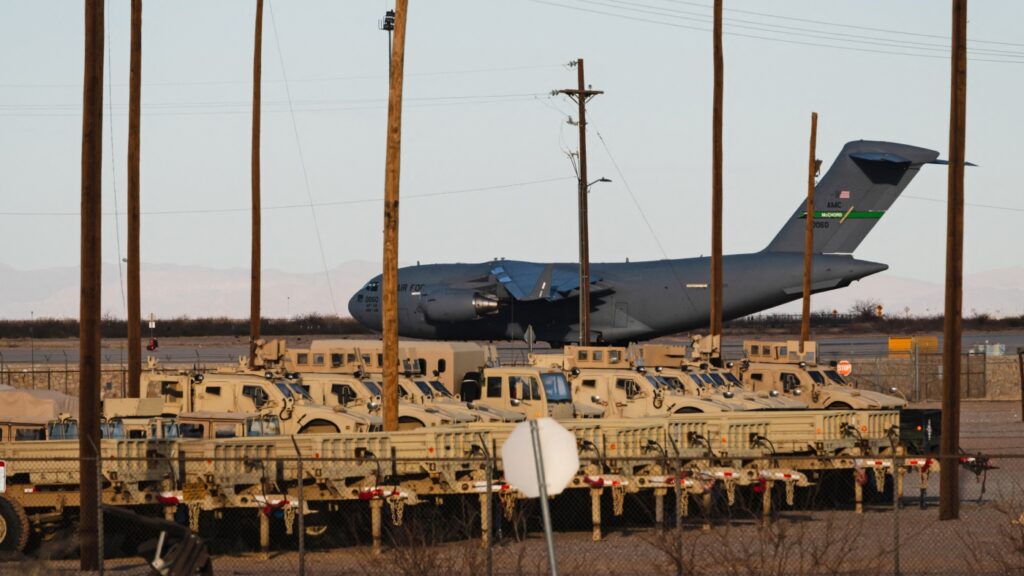
A United States Air Force Boeing C-17 used for deportation flights is pictured at Biggs Army Airfield in Fort Bliss, El Paso, Texas on February 13, 2025. Trump has been unhappy with the number of arrests so far and has directed federal immigration officials to meet higher detention quotas, the Washington Post reported. It said he was ordering ICE to raise the arrest numbers from a few hundred a day to at least 1,200 to 1,500, citing people with knowledge of internal briefings. (Photo by Justin Hamel / AFP) (Photo by JUSTIN HAMEL/AFP via Getty Images)
WASHINGTON, D.C. – The U.S. Supreme Court has temporarily stayed a lower court order, allowing the continued deportation of individuals to countries other than their own, pending further legal proceedings.
Breaking: Supreme Court Decision
On Monday, the Supreme Court issued an unsigned order that pauses the enforcement of a ruling by Judge Brian Murphy of the U.S. District Court for the District of Massachusetts. The ruling had mandated that individuals facing deportation to third countries be given the opportunity to challenge their deportation orders.
Immediate Impact
The decision affects a group of men from various countries, including Myanmar, Laos, Vietnam, Cuba, and Mexico, who were initially slated for deportation to South Sudan. Their flight was redirected to Djibouti to provide them time to contest their final destination.
The U.S. government asserts that these individuals are violent criminals convicted of serious offenses such as murder and sexual assault, arguing they should not remain in the U.S.
Key Details Emerge
Judge Murphy’s order required that deportees receive a “credible fear” interview in their native language and be granted at least 15 days to challenge their deportations. However, the Supreme Court’s decision has put this requirement on hold.
Judicial Dissent
The court’s three liberal justices—Sonia Sotomayor, Elena Kagan, and Ketanji Brown Jackson—dissented. They emphasized the importance of caution in matters of life and death, criticizing the government’s approach.
“In matters of life and death, it is best to proceed with caution,” the dissenters wrote. “In this case, the Government took the opposite approach.”
Industry Response
U.S. Solicitor General John Sauer argued that Judge Murphy’s order was “wreaking havoc” on the deportation process. He claimed that the U.S. had secured agreements with third countries to accept deportees through “sensitive diplomacy,” but these efforts were being undermined by the district court’s procedures.
Legal Challenges
Immigration lawyers contend that even those accused of crimes deserve a fair chance to contest their deportation, especially when facing dangerous conditions abroad. They highlighted that the men received less than 24 hours’ notice before their scheduled deportation.
By the Numbers
The deportation flight included individuals from five countries and was redirected to Djibouti, affecting several migrants and U.S. detention officers.
Background Context
The Trump administration has prioritized deporting individuals to third countries, including China, Venezuela, and Cuba, as part of its immigration policy. This strategy aims to expedite deportations and reduce the likelihood of return to the U.S.
Regional Implications
South Sudan, one of the intended destinations, is politically unstable and among the world’s poorest nations. Critics argue that deporting individuals there could expose them to severe risks, including torture.
What Comes Next
As the legal proceedings continue, the Supreme Court’s decision allows the government to maintain its current deportation procedures. The case remains under review in the lower courts, with significant implications for U.S. immigration policy and international relations.
Experts predict further debates and legal challenges as the situation develops, underscoring the contentious nature of deportation policies and their impact on human rights.






